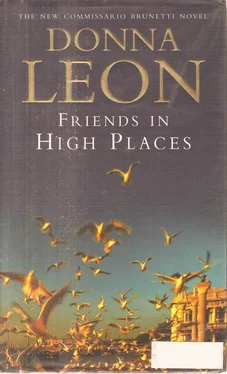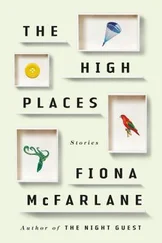Rizzardi asked a second question. ‘Did you see her teeth?’
Again, Brunetti had to put himself back in the room. ‘I noticed only that it looked as if they were all there, not like with most drug addicts. Why do you want to know?’
‘There was blood on her teeth and in her mouth,’ Rizzardi explained.
The words took Brunetti back to that squalid room and the two figures draped across one another. ‘I know. It was all over her face.’
‘That was her blood,’ Rizzardi said, putting heavy emphasis on the pronoun. Before Brunetti could question him, he went on, ‘The blood in her mouth was someone else’s.’
‘Zecchino’s?’
‘No.’
‘Oh, my God, she bit him,’ Brunetti said, and then asked, ‘Did you get enough to…’ and stopped, uncertain about just what it was Rizzardi would be able to get. He’d read endless reports about DNA matching and blood and semen samples that could be used as evidence, but he lacked both the scientific knowledge to understand how it all worked as well as the intellectual curiosity to care about anything other than the fact that it could be done and that positive identifications could be made from the results.
‘Yes,’ Rizzardi answered. ‘If you can find me the person, I have enough to match him to the blood in her mouth.’ Rizzardi paused and Brunetti could tell from the tension on the line that he had much more to say.
‘What is it?’ he asked.
‘They were positive.’
What did he mean? The results of his tests? The samples? ‘I don’t understand,’ Brunetti admitted.
‘Both of them, the boy and the girl. They were positive.’
‘Dio mio!’ Brunetti exclaimed, understanding at last.
‘It’s the first thing we check with addicts. He was much farther along than she was; the virus had really taken hold. He was already far gone, couldn’t have lived another three months. Didn’t you notice?’
Yes, Brunetti had noticed, but he hadn’t understood, or perhaps he had been unwilling to look too closely or to understand what he saw. He had paid no real attention to how thin Zecchino was or to what that might mean.
Instead of answering Rizzardi’s question, Brunetti asked, ‘What about the girl?’
‘She wasn’t as bad; the infection wasn’t as far advanced. That’s probably why she was strong enough to try to fight them off.’
‘But what about these new medicines? Why weren’t they taking any?’ Brunetti demanded, as if he thought Rizzardi would have an answer.
‘I don’t know why they weren’t, Guido,’ Rizzardi said patiently, remembering that he was speaking to a man with children little younger than the two victims. ‘But I saw no sign in their blood, or anywhere inside them, that either one of them was taking anything. Drug addicts usually don’t.’
Neither of them chose to say anything further about that. Instead, Brunetti asked, ‘What about the bite? Tell me.’
‘There was a lot of flesh caught between her teeth, so whoever it was she bit has a nasty wound.’
‘Is it contagious like that?’ Brunetti asked, amazed that, after years of information and talk and articles in the papers and magazines, he had no clear idea.
‘Theoretically, yes,’ Rizzardi answered. ‘There are cases in the literature where it seems to have been spread that way, though I’ve never had first-hand knowledge of it. I suppose it could happen that way. But the disease isn’t like it was years ago: the new medicines control it pretty well, especially if they start taking them in the early stages.’
Brunetti listened, wondering about the possible consequences of ignorance like his own. If he, a man who read widely and had a reasonably broad knowledge of what was happening in the world, had no idea of how contagious a bite could be and still had a sort of primitive, atavistic horror that the disease could be passed on in this manner, then it would not surprise him in the least if the fear were widespread.
He pulled his attention back to Rizzardi. ‘But how bad is the bite?’
‘I’d say he’s got a chunk missing from his arm.’ And before Brunetti could ask, he said, ‘There were hairs in her mouth. Probably from the forearm.’
‘How big was it?’
After a moment’s thought Rizzardi said, ‘About the size of a dog’s bite, perhaps a cocker spaniel.’ Neither of them commented on the bizarre comparison.
‘Enough to go to a doctor about?’ Brunetti asked.
‘Maybe, maybe not. If it becomes infected, then yes.’
‘Or if they knew she was positive,’ Brunetti continued. ‘Or came to realize it after.’ Anyone aware that he’d been bitten by an infected person would flee, terrified, to anyone who could tell him whether the disease had been passed on to him, Brunetti was sure. He considered the consequences: doctors would have to be called, hospital emergency rooms notified, contact made even with pharmacies where the killer might go in search of antiseptics or dressings.
‘Is there anything else?’ Brunetti asked.
‘He would have been dead before the end of the summer. She might have lasted another year, but not much longer.’ Rizzardi stopped for a moment and then added, in an entirely different voice, ‘Do you think they leave scars on us, Guido, the things we have to say or do?’
‘Sweet Jesus, I hope not,’ Brunetti answered in a soft voice, said he’d be in touch with Rizzardi when he had an identification of the girl, and hung up.
He called down to the officers’ squad room and told them to be alert for any new reports of a girl gone missing, about seventeen, and to start checking back through the records to see if any had been reported in the last few weeks. Even as he spoke to them, however, he knew it was entirely possible that no one would report her: many kids had become disposable, their parents not at all concerned at prolonged absences. He wasn’t sure about her age, but seventeen would be his guess. He hoped she wasn’t any younger. If she was, Rizzardi would probably know, but he didn’t want to.
He went down to the men’s room and washed his hands, dried them, and washed them again. Back at his desk, he took a piece of paper from his drawer and wrote in bold capital letters the headline he wanted to see in tomorrow’s papers: ‘Killer’s Victim Takes Vengeance With Fatal Bite’. He looked down at it, wondering, like Rizzardi, what sort of scars these things would leave on him, drew an insert mark between ‘Vengeance’ and ‘With’ and added, ‘From Beyond the Grave’ on the line above. He studied this for a moment but decided the additional phrase made the line too long to fit in one column and so crossed it out. He pulled out the dog-eared notebook in which he kept names and phone numbers and again dialled the office number of the crime reporter of Il Gazzettino. His friend, flattered that Brunetti had liked the other story, agreed to see that this one got into next morning’s edition. He said he loved Brunetti’s headline and would make sure it appeared as written.
‘I don’t want you to get in any trouble,’ Brunetti said in response to the man’s eager compliance. ‘There’s no risk, is there, if you print it?’
The man laughed outright. ‘Trouble for printing something that’s not true? Me?’ Still laughing, he started to say goodbye, when Brunetti stopped him.
‘Is there any way you could get this into La Nuova, as well?’ he asked. ‘I want it in both papers.’
‘Probably. There’s someone over there who’s been hacking into our computer for years. It saves them the cost of a reporter. So I’ll just type this in, and they’ll use it, especially if I make it sound really lurid. They can’t resist blood. But they won’t use your headline, I’m afraid,’ he said with real regret. ‘They always change them, at least one word.’
Читать дальше











